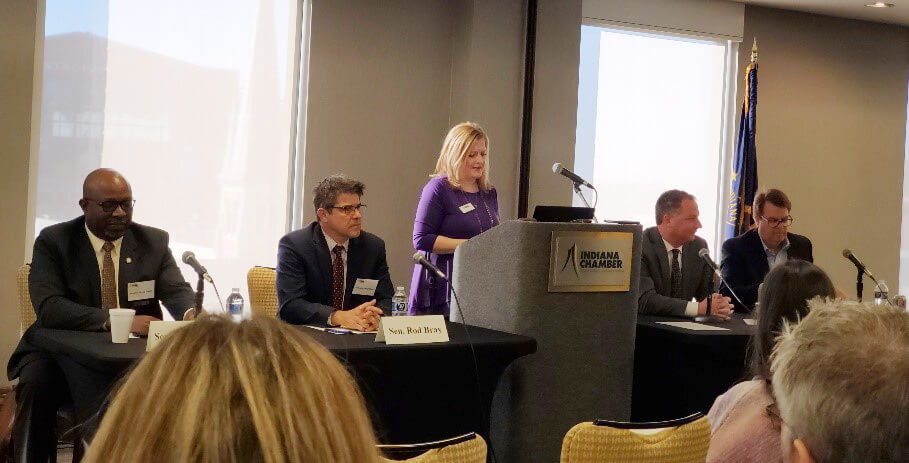Legislators – new and old – convened in the Statehouse Tuesday afternoon for Organization Day – a day often described as the equivalent to the first day of school when everything feels fresh and everyone is happy to see each other. Always held two weeks after Election Day, this is the day when they receive their oaths of office, formally elect their leaders, and hear speeches about plans and priorities for the Session. After this brief business session, they adjourned until Monday, January 9th.
As has also become tradition, on Monday the leaders of the four caucuses – Senate Minority Leader Greg Taylor (D-Indianapolis), Senate President Pro Tem Rod Bray (R-Martinsville), Speaker Todd Huston (R-Fishers), and House Minority Leader Phil GiaQuinta (D-Fort Wayne) – joined the IN Chamber of Commerce’s VP of Communications, Rebecca Patrick, for their Legislative Preview to discuss their priorities for the year and respond to questions from the attendees. Much of what they shared Monday was repeated in the Statehouse on Tuesday when they also added talk about tax cuts, including the idea of completely eliminating the state’s income tax…not next year, but over the long-term.

Healthcare costs came up several times on Monday. A year ago Bray and Huston penned a letter to the CEO’s of Indiana hospital systems giving notice to rein in their costs or the Indiana legislature may do it for them, “The ability of Hoosiers to pay hospital prices that are often more than 50% above the national average, is untenable and unfair.” When asked how things were going on Monday, Huston was quick to respond, “Not good enough. All we asked for was for them to bring prices in line with the national average.” Bray agreed, “I concur with the Speaker. We have plenty of work to do.” Huston also pointed to personal responsibility, “Hoosiers need to take some personal responsibility for their own health instead of relying on government solutions. It’s no great shock that how you eat matters and exercising matters. I think that sometimes gets lost in these discussions, and it becomes about what government is going to do.” Taylor was quick to disagree, calling for lawmakers to “step in and do something.” Taylor insisted access was the first step, “You can do everything you want taking care of yourself, but your body is eventually going to break down. We can’t have the government in charge of approving medication and then taking no responsibility for cost.” GiaQuinta called for action to increase health metrics in the state by investing in trails and increasing the cigarette tax $2/pack to reduce Indiana’s rank of 44th in tobacco use in the nation. The contrast in perspective was stark and the sharp exchange felt like a harbinger of what is to come in January.
When asked to share their goals for the upcoming legislative session, leaders mentioned: healthcare, education, workforce development, housing, childcare incentives and “an energy policy, not an energy theory.” Bray spoke of “increasing reimbursement rates” for mental health, tackling healthcare costs and workforce issues. Taylor weighed in for Senate Democrats, “We take pride in small victories,” he began, listing issues such as funding for the statewide bone marrow registry, renewable energy initiatives, and funding for traditional public schools. GiaQuinta focused on “brain drain,” Pre-K for more Hoosier children, and urged his colleagues to “give social issues a break this session.”
